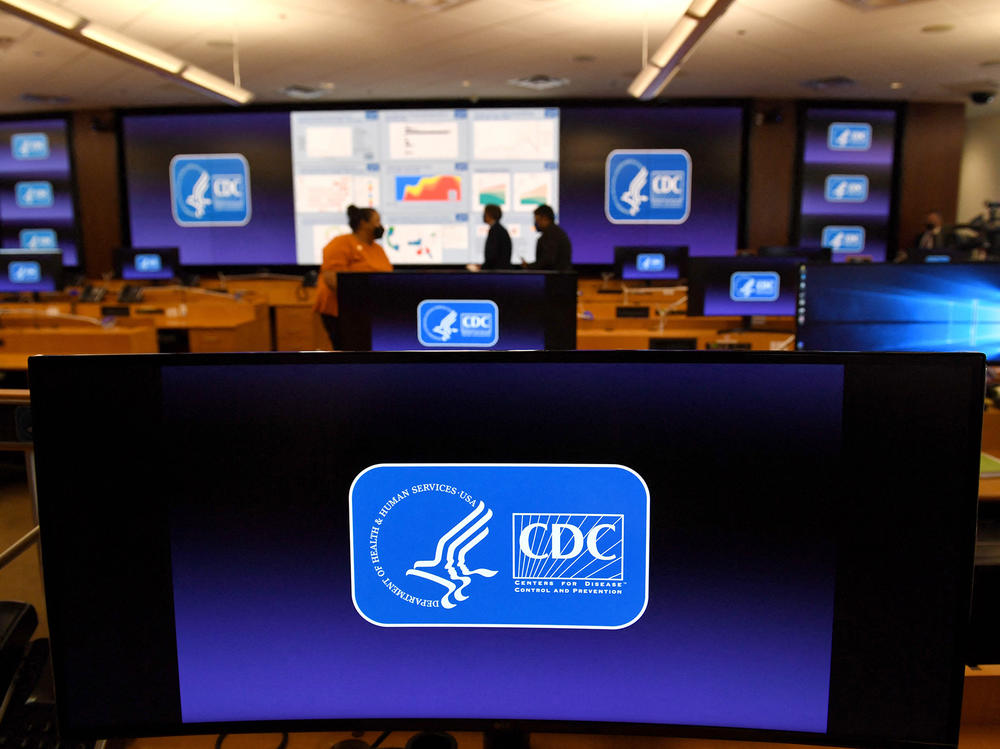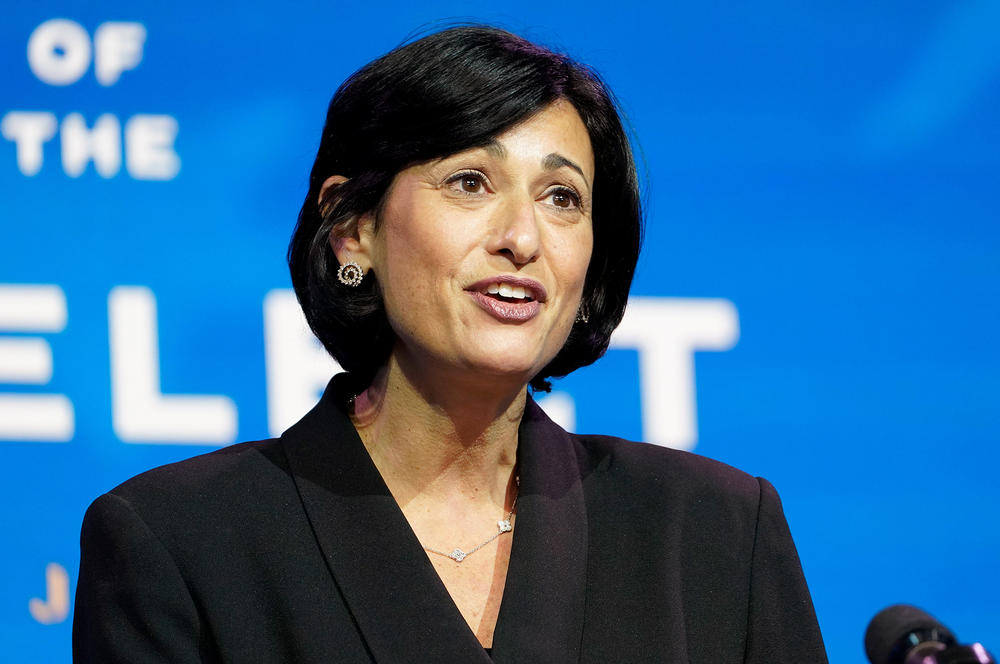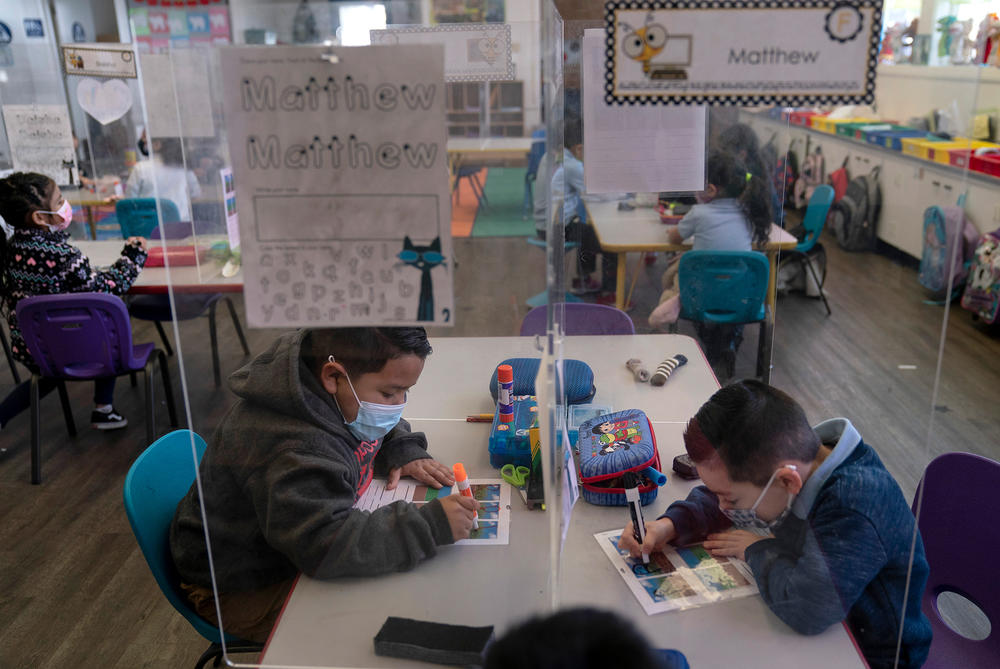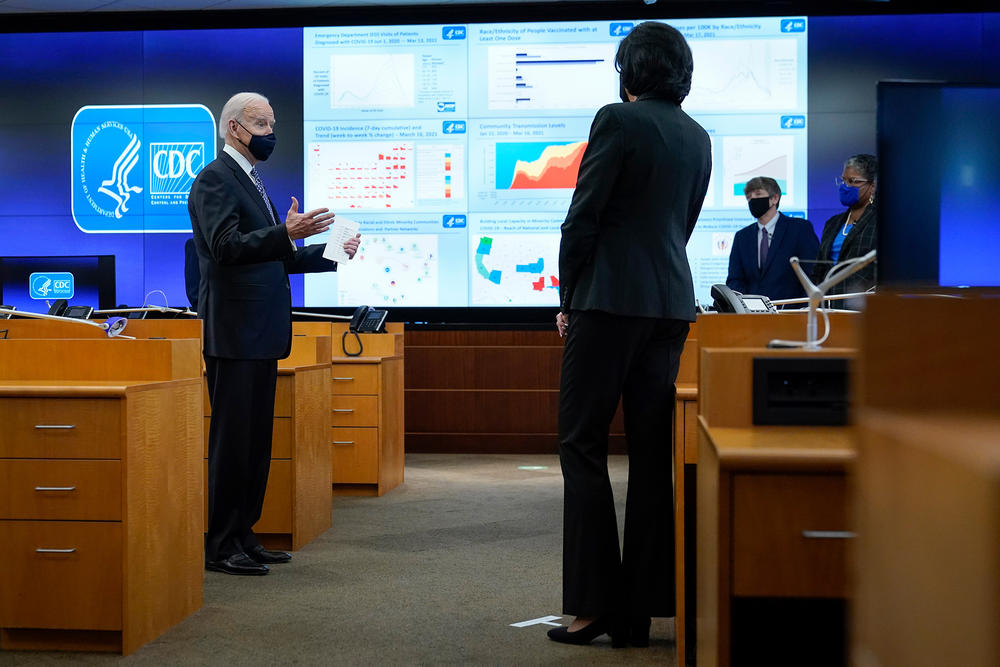Section Branding
Header Content
Inside The CDC's Battle To Defeat The Virus
Primary Content
It's been a long year for basically everyone — and especially for Dr. Henry Walke. For months on end, Walke has been pulling 13-hour work days as the COVID-19 incident response manager at the Centers for Disease Control and Prevention, a job he took on last July.
He never expected the job to last this long. "The scale of this pandemic is mind-boggling, and it's affected all of us — every facet of our work and home," he says.
Walke is heading up the largest and most challenging outbreak response in the agency's history — an all-agency effort involving more than 8,000 employees, working to guide the U.S. out of a public health emergency that has claimed more than 550,000 lives.
The CDC's sweeping COVID-19 response has involved teams deployed to trace outbreaks in vulnerable communities, consultations with hospitals and schools to mitigate transmission, embeds and trainings with state and local health departments, coordinating vaccine distribution, and major efforts to wrangle data from disparate sources to paint a clear picture of the pandemic's trajectory.
For much of the pandemic, the work has been largely invisible to the public. The agency was sidelined and contradicted by the Trump administration, leading to mixed messaging on topics such as mask use, school reopenings and testing.
When the CDC's new director Dr. Rochelle Walensky took on her new role this January, step one was to start restoring the public's faith in her agency and its scientists. "I needed to make sure that the public knew that the CDC, as they once knew it, is back," she says.
"Anybody who's been in health care and public health with this pandemic is tired," Walensky says. "I needed to make sure [the CDC staff] knew that their science was going to matter, that they knew they were going to lead public health."
In a series of interviews with CDC officials, leaders working on COVID-19 say the work of fighting the virus has been continuous and grueling — but the change in the country's leadership and the improving trajectory of the pandemic has breathed new life into the agency's response.
And it's just in time because the current challenges the agency is up against are formidable. The CDC is in a race to get the nation vaccinated quickly and equitably, while monitoring the spread of troubling coronavirus variants, and convincing a restless, pandemic-fatigued nation to continue mask-wearing and physical distancing to avoid another large surge.
"It's a long, long outbreak and requires us all to pull together and maintain some hope that it will end," Walke says. "CDC certainly has a role, but it also requires the whole U.S. government and basically all American citizens to contribute to the control."
Supporting strained local health departments
The scope of the agency's work has been staggering — among other major tasks, they send staff around the country to support local efforts to get the word out about disease prevention, to run testing and tracing programs and to vaccinate.
"You haven't always heard our voice, but the work has continued every day of the response," says Peggy Honein, task force lead for state, tribal, local, and territorial support in the CDC's COVID-19 response. Her team includes liaisons assigned to each state and tribal health department who help answer questions and respond to requests for help.
Over the past fourteen months, Honein says they've made more than 3,000 trips out to help health departments and other responders investigate case clusters in places such as in meatpacking plants and nursing homes, to gather data in school settings and to help with contact tracing efforts.
As the pandemic has dragged on, the requests for support have evolved. Health departments have received infusions of money and resources, and CDC deployments have shifted away from filling in at understaffed health departments, towards providing help with training and interpreting guidance.
The basic building blocks of disease prevention continue to be critical — and very challenging — for local communities, she says. "Continuing to message the importance of screening, testing and identifying infectious individuals and getting them isolated is very important — and coming up with creative ways to do that."
Fourteen months in, many of their state and local partners are exhausted, Honein says.
She often hears from state and local health departments about the long hours their staff continue to work day in and out, and the question for the CDC is: "How can we come up with a plan that doesn't have individuals always working seven days a week?" Honein says the work is starting to pivot from an acute response to thinking about building up more sustainable public health systems.
Rebuilding trust in guidance
Translating the quickly evolving science of the coronavirus into concrete guidance for the public has posed another ongoing challenge for the agency.
"In early days, you saw more consistency across our guidance because we made certain assumptions," says Greta Massetti, task force lead for community interventions and critical populations. Her team adapts COVID-19 safety guidance for settings such as schools, workplaces, prisons and homeless shelters and helps administrators implement it.
As the scientific understanding changed, the CDC's guidance has too. Recently this has meant tailoring some advice for specific populations, like kids or nursing home residents.
But changes to guidance have often confused the public, because the reasons for the shifts were not always transparent — and in some cases, such as an early push to reopen schools last summer and the temporary removal of recommendations to test non-symptomatic people, were tainted by political pressure from the Trump administration.
Such issues have contributed to questions from the public on whether they can trust the CDC's guidance, says Lisa M. Lee, a former CDC official and now an associate vice president at Virginia Tech.
"The public wants scientific information, evidence-based recommendations from CDC," she says, "And there was a time during the Trump administration when there was political interference."
CDD director Walensky says the CDC is working to earn that public trust back — by providing increased transparency to CDC guidance and clear, cohesive messaging.
"We inherited an unfortunate situation," she says. "[As] the agency that is putting out public health guidance for this country and modeled for the world, people have to trust what we say."
Walensky ordered a review of the CDC's past COVID-19 guidance to help ensure that it's driven by science and not politics. It was completed in early March, and resulted in the removal of some guidance on the website that was not authorized by CDC scientists. "We need to make sure people know that what's on the CDC website has been blessed by the subject matter experts at the CDC," she says.
She also pointed to a recent change that decreases the recommended distance between students in K-12 schools from six feet to three feet, posted with a science brief that explains the evidence behind the update — a process Walensky has pledged to continue with every major guidance update.
Lee agrees that showing people the evidence will help rebuild trust. "It's not just, 'We changed the recommendations because we have new information.' It's 'Here's the new information,'" she says.
Consistent messaging across government
Lee also observes that public health messages from the CDC, other health agencies and the White House are now in lockstep. "People are saying the same thing. That consistency of message is a huge part of restoring public trust."
Still, "The trust isn't a light switch," Lee says, "It's going to take people a while to see [that] this is really the case."
CDC insiders say the Biden-Harris administration has been supportive not just in words but in policy.
"The mask mandate in the transportation corridor that came out in the beginning of this administration was really powerful," says Dr. Martin Cetron, director of the CDC's division of global migration and quarantine, "The testing orders that came out really were helpful too."
Cetron says having public health and politics pulling in the same direction smoothes the path ahead.
In agreeing to use science and data to drive decision-making, "we [can] collectively take shared actions that are in both our short-term and long-term interest, rather than constantly seeing this as seesaw, as somebody winning and somebody losing," he says.
Fixing systems and rebuilding public health infrastructure
While having the support of top leadership removes major obstacles in the CDC's path, it doesn't solve all its problems overnight, says Dr. Ali Khan, a former CDC official who now serves as Dean of the College of Public Health at the University of Nebraska.
"My caution for the agency is that [I hope] they don't lump all of their troubles under politicization of the response," he says, "There are fundamental issues that need to be fixed about public health in America and that need to be fixed at CDC."
Lee concurs, noting that the problems predate the Biden and Trump administrations.
"There's been a real lack of investment in public health infrastructure for decades," she says. "You can't not attend to something and then expect it to be there when you need it. You can't not repair roads, and then when you need to use the road, it's crumbled and you go, 'Why does this thing not work?' That's what's happened with public health."
Khan and other critics point to early pandemic missteps by the CDC on testing and masking, and broad issues with public health in the U.S., such as its "sclerotic bureaucratic structure" — outdated data systems, piecemeal structures for funding and supporting state and local health departments — which have hampered the current response. They say these things could jeopardize the nation's ability to respond to future public health threats, if they go unfixed.
"We as an agency have to admit some things didn't go well," Walensky says, "We need to do a full review...and we have to own it and make it better the next time."
For now the agency is focusing on its race to vaccinate and beat back the virus before new variants can take hold. All while figuring out fresh ways to battle pandemic fatigue in the public, and dealing with the realities of the pandemic on their personal lives.
"Basically, everybody is working from home and many of us are also caring for our children," says Adam MacNeil, head of the epidemiology task force in the CDC's COVID-19 response. "We're all struggling where we can't see loved ones, or have lost loved ones. It hits home on a daily basis."
"It's been a challenge," he says, "[but] at the end of the day, our goal is to do our job as well as possible to try to stop this pandemic.
Copyright 2021 NPR. To see more, visit https://www.npr.org.
Correction
An earlier version of this story misspelled Peggy Honein's last name as Hoenin.




